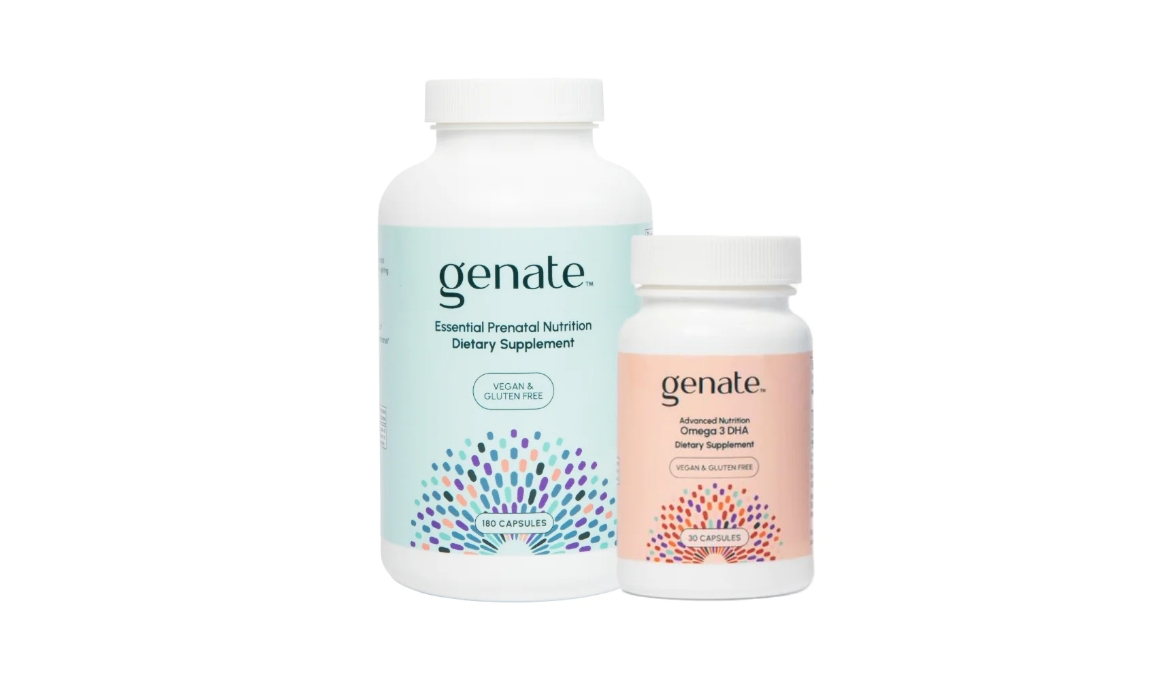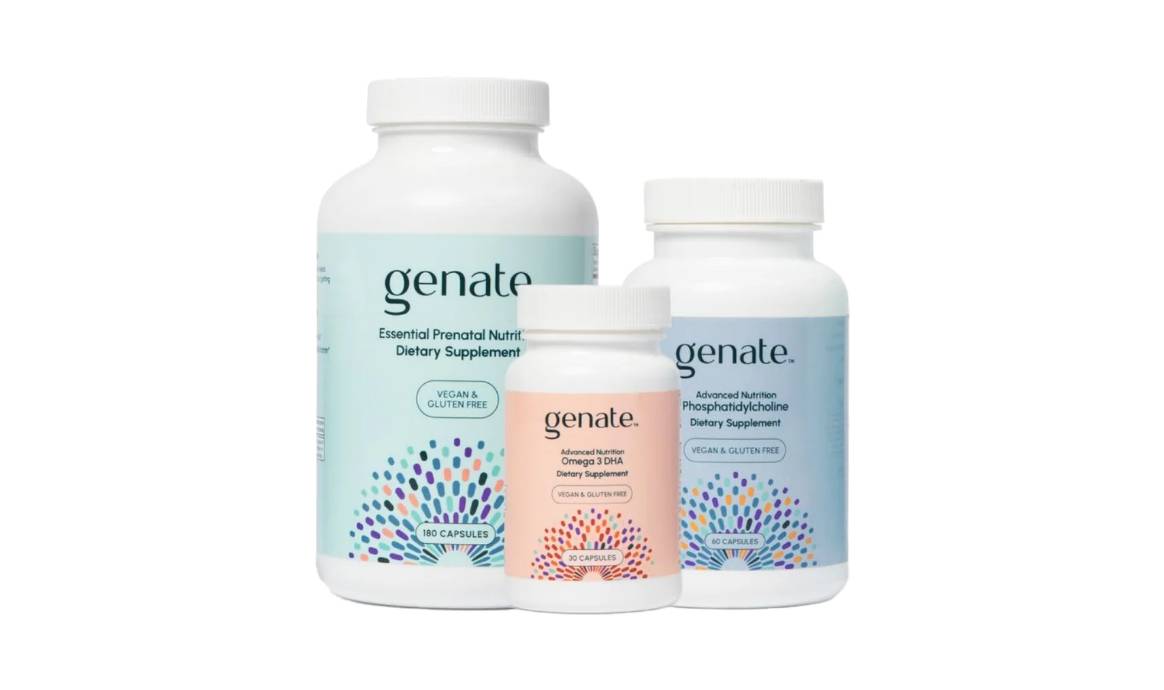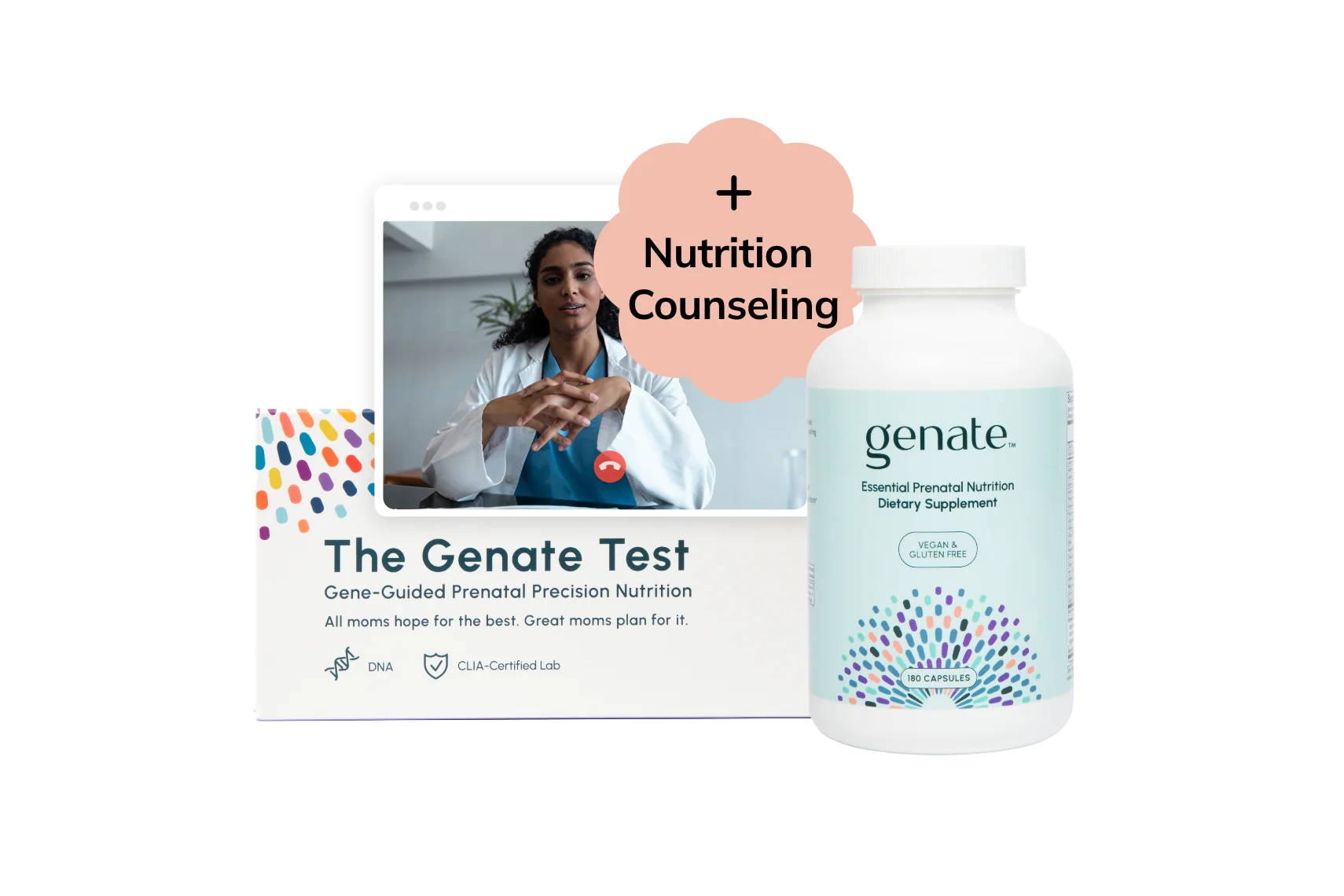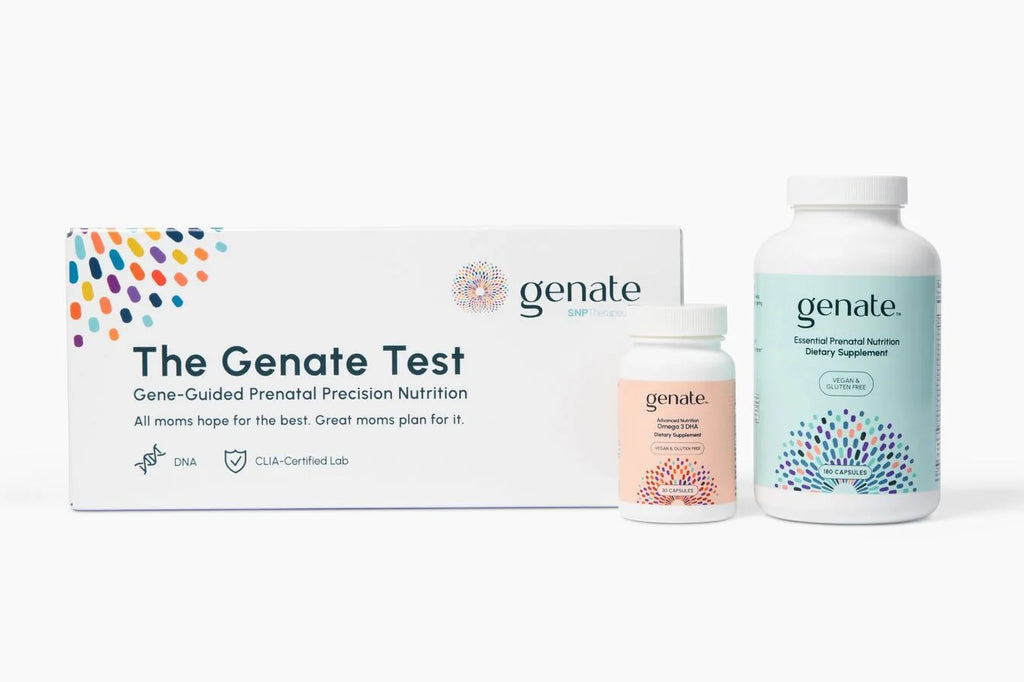Good nutrition is essential for every stage of your baby’s growth and development. But the efficiency with which your body metabolizes nutrients is partly determined by your genes, and common genetic variants can affect the metabolism of one-carbon nutrients that are critical for the development of your child’s brain and spinal cord. Genate Essential Prenatal Nutrition is a multivitamin formulated from academic research that provides women with a formulation optimized to support their baby’s cognitive development. It includes the one-carbon nutrients choline, betaine, methylfolate, and B vitamins that many women have trouble metabolizing and/or don’t get enough of in their diet.
MISCELLANEOUS
Is Vitamin A Safe to Take While Pregnant?
by Libby Pellegrini, MMS, PA-C
medically reviewed by Cara Everett, MS, RDN, LDN
November 22, 2023 • 6-minute read
Vitamin A is an essential nutrient during pregnancy that nurtures a developing baby’s heart, lungs, circulatory system, eyes, and bones. However, there is an upper limit on how much vitamin A is safe in pregnancy, so being deliberate about your vitamin A intake during pregnancy is crucial.
If you’re pregnant or planning a pregnancy, you may have questions about how to support your pregnancy journey with nutrition. Your nutrition requirements are higher during pregnancy to support your changing body and the growth and development of your baby in utero.
One vitamin that is a crucial nutrient for your baby during pregnancy is vitamin A. While you might have heard the warnings regarding vitamin A toxicity while pregnant, vitamin A is a vital nutrient for you and your growing baby.
Read on to learn more about the role of vitamin A, how much vitamin A is safe, and how much is too much during pregnancy.
Vitamin A in Pregnancy: Its Roles and Benefits
Vitamin A is a fat-soluble vitamin used in many processes in the body. For women planning a pregnancy or who are pregnant, vitamin A supports vision, immune function, and cellular communication. For a developing baby, vitamin A is necessary for a healthy pregnancy because it supports the development of:
- Heart and lungs
- Eyes
- Skin and bones
- Blood vessels
- Immune system
How Much Vitamin A Is Safe?
Health experts have produced guidelines for vitamin A consumption in pregnancy:
- The recommended daily allowance (RDA) for pregnancy, according to the 2020-2025 Dietary Guidelines for Americans, is 750 mcg in the first trimester of pregnancy and 770 mcg in the second and third trimesters.
- The tolerable upper intake levels (ULs) for Vitamin A in pregnancy and lactation are 3,000 mcg daily.
How Much Is Too Much Vitamin A During Pregnancy?
While vitamin A is a crucial building block during pregnancy, exceeding the UL can cause problems. In fact, experts at the National Institutes of Health (NIH) note that excessive vitamin A, also known as vitamin A toxicity, can lead to birth defects such as malformation of a baby’s eyes, skull, lungs, and heart.
In an expectant mother, signs of vitamin A toxicity may include severe headaches, blurry vision, nausea, dizziness, muscle aches, dry skin, fatigue, depression, or abnormal liver function. For these reasons, the NIH cautions people who are planning a pregnancy, pregnant, or lactating not to exceed 3,000 mcg of vitamin A daily.
Which Foods Contain Vitamin A?
Vitamin A can be found in a number of food sources. These foods include:
- Beef liver
- Sweet potato
- Spinach
- Pumpkins
- Carrots
- Atlantic herring
- Milk
- Cantaloupe
- Red peppers
- Mangos
- Fortified breakfast cereals
- Eggs
- Black-eyed peas
- Apricots
- Broccoli
- Salmon
- Tomato juice
Most pregnant women are able to meet their daily vitamin A requirement through food and prenatal vitamins alone. Taking prenatal vitamins with vitamin A can help women ensure they are getting the consistent amount of vitamin A needed in pregnancy.
How To Determine if You Need a Vitamin A Supplement While Pregnant
It’s important for expectant women to know their vitamin A requirements may be different from the RDA, based on how their genetic makeup affects their vitamin A metabolism. This is why genetic screening with the Genate Test can be a great way for expectant mothers to identify their individual needs for vitamin A intake and choose the most effective prenatal vitamin.
In general, if you have a balanced diet, you should not need a vitamin A supplement. However, if you are experiencing any of the symptoms of vitamin A deficiency below, consult with your doctor:
- Night blindness, or trouble seeing in low light.
- Frequent infections, since vitamin A bolsters the immune system.
- Skin and eye irritation or dryness, with scaling or itching.
Wondering if you need more or less vitamin A in your diet? Our team of dietitians offers maternal nutritional counseling tailored to your specific needs.
The Bottom Line
Vitamin A is a crucial nutrient during pregnancy because it supports your baby’s overall growth, including the development of the heart, lungs, circulatory system, kidneys, eyes, and bones. During your pregnancy journey, you can get vitamin A from various plant and animal food sources, fortified foods, and prenatal vitamins.
However, it’s important to be aware of your vitamin A intake, as exceeding the tolerable upper limit can raise the risk of toxicity and birth defects.
To learn more about supporting your baby’s nutrition during pregnancy, make sure to check out the Precision-Nutrition Package from SNP Therapeutics.
This article is not intended as medical advice to treat or diagnose any health condition but rather as educational health information for the general public. It should not be used as a substitute for individualized medical care from your healthcare provider.
Shop the Article
Save 23% today!
Genate Essential Prenatal Multivitamin + Advanced Omega-3 DHA Package
Bundle to increase savings and provide the foundational nutrients needed for optimal health and development.
From $72 per month
Save 23% today!
Comprehensive Prenatal Support Package
Genate Essential Prenatal Multivitamin + Advanced Omega-3 DHA + Phosphatidylcholine
Our most comprehensive bundle - you’ll receive our Essential Prenatal Multivitamin, Advanced Phosphatidylcholine, and Advanced Omega-3 DHA.
From $110 per month
Save 30% today!
Comprehensive Prenatal Nutrition Bundle
Buy the Genate Test and a nutrition counseling session with a Genate registered dietitian, and receive a 30-day supply of the Genate Essential Prenatal Multivitamin FREE. Purchase includes a 90-day prenatal multivitamin subscription at our best monthly price.
$309

About Libby Pellegrini, MMS, PA-C
Libby is a professionally trained journalist and physician assistant. She has worked in numerous healthcare settings, including the rural United States, an inner-city Level I trauma center, and several suburban acute care centers. It was during her time at a functional medicine clinic in Southeast Asia that she developed an interest in the role of SNPs in personalized genetic evaluation and discovered how gene-guided nutritional counseling can enhance individual health outcomes.
Libby graduated Magna Cum Laude from Northwestern’s Medill School of Journalism, and her medical writing has appeared in a number of outlets, including WebMD, RxSaver, KevinMD, NPHIC, and Men’s Health.
Website: https://libbypellegrini.com/
LinkedIn: https://www.linkedin.com/in/libby-pellegrini-pa-c/
References
- Vitamin A. NIH Office of Dietary Supplements. https://ods.od.nih.gov/factsheets/VitaminA-HealthProfessional/. Updated June 15, 2022. Accessed September 20, 2023.
- Dietary guidelines for Americans, 2020-2025. United States Department of Agriculture. https://www.dietaryguidelines.gov/sites/default/files/2020-12/Dietary_Guidelines_for_Americans_2020-2025.pdf. Published 2020. Accessed September 20, 2023.
- Vitamin A and carotenoids. National Institutes of Health. https://ods.od.nih.gov/factsheets/VitaminA-HealthProfessional/ Updated June 15, 2022. Accessed October 15, 2022. Maia SB, Souza ASR, Caminha MFC, da Silva SL, Cruz R, dos Santos C, et al. Vitamin A and pregnancy: a narrative review. Nutrients. 2019;11(3):681. https://doi.org/10.3390/nu11030681
- Vitamin A deficiency. Cleveland Clinic. Accessed October 30, 2023.
Take the Genate Quiz
Take our Nutrition Quiz to learn more about your nutrition journey.
Read Our Latest Articles
Frequently Asked Questions
What are the benefits of my baby getting the proper nutrients?
What are one-carbon nutrients and fatty acids, and why are they important?
One-carbon nutrients and fatty acids are critical for brain and spinal cord development during pregnancy and through the first two years of life. Although all nutrients are important, the one-carbon nutrients choline, folate, betaine, and B vitamins, along with the omega-3 fat DHA, provide the building blocks for proper growth of your developing baby's brain. Research at Cornell and Harvard universities has shown cognitive benefits for children born to mothers who received increased levels of one-carbon nutrients during pregnancy, demonstrating that optimal nutrition during pregnancy can have lasting effects for your baby.
If I buy Genate nutrition supplements, do I still need to take the test?
Genetic testing is a personal choice, and only you can decide what’s best for you and your baby. But the Genate Test is a powerful tool for optimizing your nutrition status, as it identifies genetically-caused metabolic inefficiencies that may influence your body’ ability to make and use the nutrients critical for your baby’s cognitive development. If you have SNPs in any of the nutrient pathways tested, your Genate Report will provide personalized recommendations for optimizing your nutrition. Our registered dietitians can show you how to fill in the gaps with foods and supplementation, if needed, to make sure you’re getting the nutrition you and your baby need.








